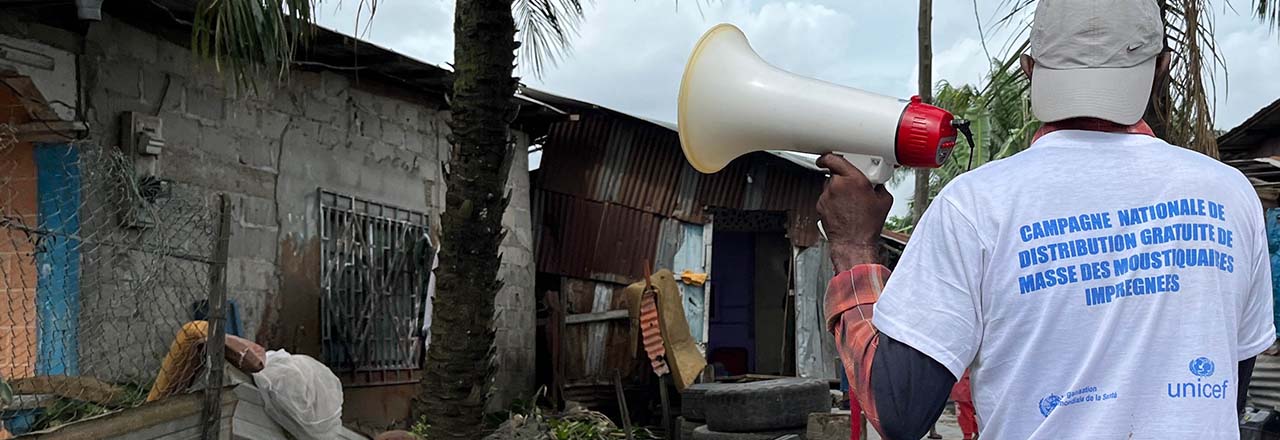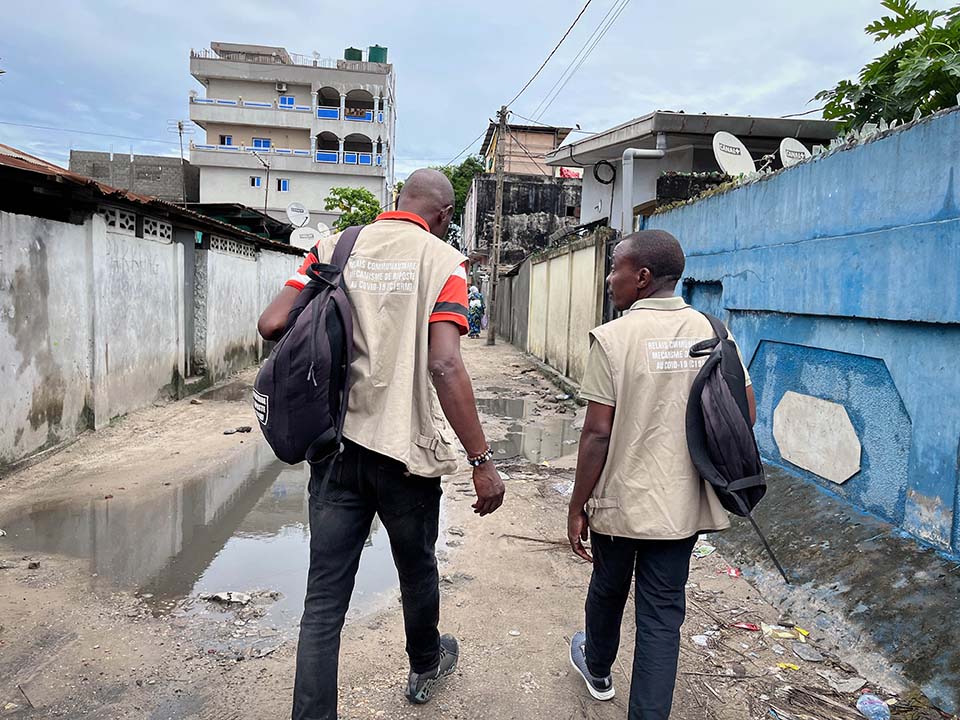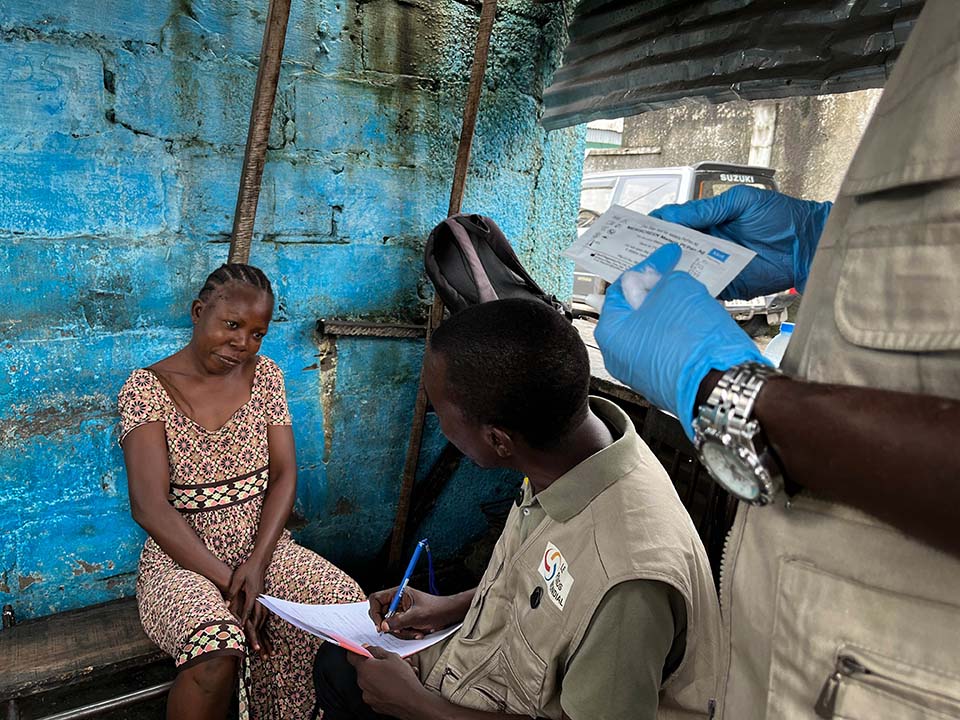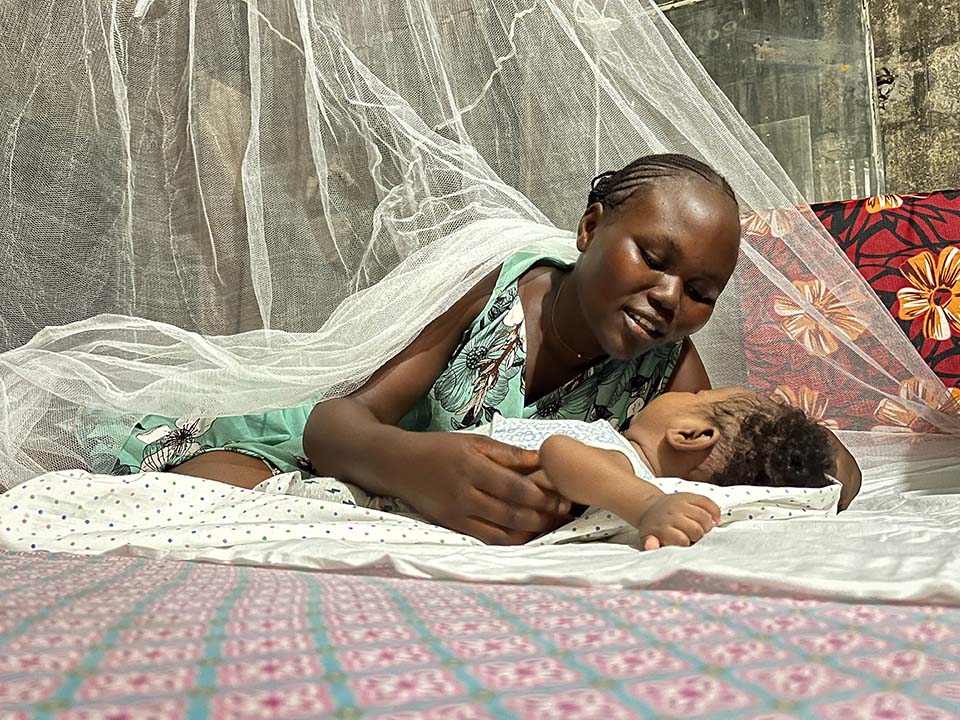

Reducing Malaria in the Republic of the Congo
Three times a week, Fernand Sel, Mouidi Beu Monsang and Hugues Bouiti pull on their rain boots and grab their backpacks. They head out early in the morning to communities in the Mvoumvou health district, in the city of Pointe-Noire, in the Republic of the Congo. The team will spend their day walking door to door to check families for signs of sickness, including malaria, tuberculosis, HIV, malnutrition and diarrhea, as well as make sure children are up to date on routine vaccines.

Community health workers Fernand Sel, left, and Hugues Bouiti, right, go door-to-door in the Pointe Noire department of the Republic of the Congo to check families for signs of illnesses such as malaria, tuberculosis, HIV, malnutrition, and diarrhea, as well as make sure children have been vaccinated.
Photo by Jennifer Lazuta/CRS
As community health workers, Fernand, Mouidi and Hugues play an important role in the early detection and treatment of some of the most common and life-threatening diseases in the Republic of the Congo. They have been trained to identify the signs and symptoms of these diseases and to administer rapid malaria tests.
Malaria remains one of the leading causes of hospitalization and death in the country, particularly among pregnant women and children under age 5.
“When the community suffers, it hurts me,” Fernand says. “So I’m in the community to help improve their health.”
Each worker carries malaria treatment pills and other over-the-counter medications to treat symptoms, such as fever or body aches. More complicated cases are referred to a nearby hospital or health center for further testing and care. The workers provide these basic services free of charge, as part of the Malaria Control Project in the Republic of the Congo, implemented by Catholic Relief Services in partnership with the national Ministry of Health and Population, with funding from the Global Fund.
Such early detection is key as people often wait too long to seek medical care.

Community health worker Hugues Bouiti consults with Mireille at her home. She has been suffering from a fever, fatigue and loss of appetite for the past few days. She tests positive for malaria, so he gives her a course of treatment pills to take and will check back in on her in a few days.
Photo by Jennifer Lazuta/CRS
“It’s not very easy to go to the hospital because of the cost,” says Mireille Soungou, a community member who tested positive for malaria during a visit by the community health workers. “I feel happy with the visits because before I didn’t know I had the opportunity to have an exam and receive the malaria treatment.”
To further reduce the burden of malaria, the Ministry of Health, in partnership with CRS and other organizations, holds a mass distribution of long-lasting insecticidal nets every two years, in addition to the routine distribution to pregnant women during their first prenatal consultation. The goal is to reach each family with at least one free mosquito net.
At the same time, community health workers remind people of prevention measures, such as clearing away stagnant water where mosquitos breed, frequenting health centers when signs of malaria appear and always sleeping under the nets. Town criers further amplify these messages, going through communities with megaphones and giving mini-sensitization sessions.

Sarah Mokane prepares to sleep with her 3-month-old son, Jean Claude, under a long-lasting insecticidal mosquito net at her home in the Mvoumvou Health District in the Republic of the Congo.
Photo by Jennifer Lazuta/CRS
“If we can eradicate or reduce the rate of infection that will reduce morbidity,” says chief medical officer of the Moumvou health district, Dr. Livelene Lascard Adjouno. “We need to get rid of stagnant water and clean the environment. People need to come at the first symptoms to get treatment. The campaign is helping to lower the rate.”
Congo Malaria Control Project, NFM3/Global Fund
The aim of the project is to contribute to improving the health of people in the Republic of the Congo by reducing the human and socio-economic burden of malaria, which is still a serious public health problem in the country and remains one of the leading causes of morbidity and mortality there. The project is aligned with the national strategic plans for the fight against malaria, with a focus on:
- Limiting or eradicating mosquitoes and other disease transmitting insects through the long-lasting insecticidal nets distribution campaign.
- Establishing case management of pregnant women and children under age 5 by health facilities.
- Improving integrated case management at the community level.
- Strengthening the health information system, the community, and the fight against COVID-19.


